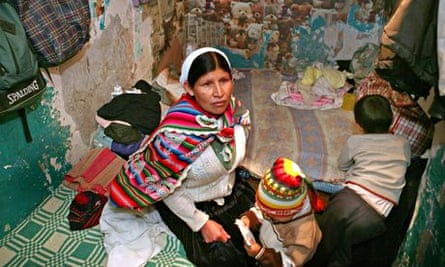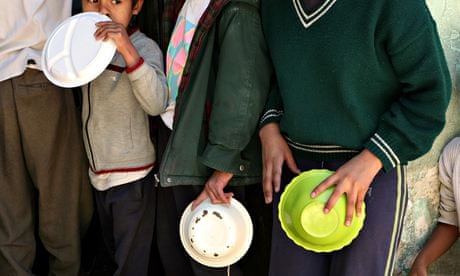Rosy is a young working mother who drops her two daughters off at school each morning before scouring the markets for ingredients to make the meals she cooks and sells later in the day. Every afternoon she picks her daughters up from school and they head home to San Pedro, Bolivia's most notorious prison.
"In the beginning I was afraid. I thought that anything could happen here, but the days went by," Rosy says, of raising her children behind bars. "Everything depends on the parents, how we organise to protect and take care of the children. Outside it's the same."
According to official figures, 1,500 Bolivian children live with a parent behind bars, but the total could be much higher – especially during school holidays when children visit incarcerated parents.
Hundreds of women and children living alongside prisoners, pass out through the metal gates every day for work or school.
According to national law, children must leave prison by the time they turn six, but many stay much longer with parents who do not want to let them go. They fear their children will be abused in homes and do not trust extended-family members, many of whom are extremely poor, to provide for them. That leaves some parents feeling that growing up in prison is a child's best – or only – option.
International organisations, including the UN, have criticised the presence of children in Bolivian prisons. Although its jails are relatively less violent than those in other Latin American countries, terrible things do happen.

Last year, a girl was raped by several men in a family in San Pedro and a child died in Palmasola jail, Santa Cruz, as fighting inmates ignited a fire that killed dozens. Those events prompted renewed efforts to remove children from prison, especially those aged 11 and over.
"No matter how good the family is, no prison is favourable for the positive development of a child," said Lidia Rodriguez, of Bolivia's human rights office.
Rodriguez said it could be difficult to find relatives outside jails willing to take care of a child, but some incarcerated parents were not motivated by their children's wellbeing. Instead, she said, they kept children with them because they hoped it would lead to early release.
San Pedro sits in the heart of the city of La Paz. Past the crumbling adobe exterior and through a barred iron gate is a patio boiling with activity, as men call to their lawyers and receive papers and packages passed through the door. There are well-dressed men in collared shirts with slick hair, and men with bleary eyes wearing stained sweatpants. There are murderers and petty thieves, people sentenced to 30 years and many more who have yet to see trial.
The prison is a world unto itself, a citadel of rickety stairs and passageways that police rarely enter, where inmates buy small cells that they enter and leave at will, and a council elected by the prisonersgoverns almost all aspects of life.
It's also a place where hundreds of women and children live alongside prisoners, passing out through the metal gate every day for work or school.
Rosy says that when her husband was jailed for assault four years ago she could not pay rent and utilities on her own. Though she admits it is not an ideal place to raise a child, she moved her family to prison.
"Necessity obligated us, because outside there are so many expenses, and it's not possible to get by alone," she says.
Rosy's husband, Juan, purchased a small cell for about £600. Prisoners are not charged for electricity and water, and receive one meal a day. Food is also provided for children under six. With those basics covered, the £60 a month Rosy can earn selling food to inmates and visitors while her husband cares for the children are enough to get by.
Many of the men inside San Pedro, however, say that the children are a big part of their parents' rehabilitation, and that staying connected to family is what makes prisoners want to get out and carry on with life.
For Rosy's daughter Nancy, five, prison is the only home she's ever known. Nancy said she liked living in San Pedro because she spent lots of time with her father, had plenty of friends and it was "fun".
Across town from San Pedro is the Obrajes women's prison, an overcrowded maze of rooms set around two small patios.
Andrea first passed through its doors as a child with her convicted mother and now, at 31, is serving time for dealing drugs. Two of her five children live with her, while the oldest are with relatives or in children's homes. Her family members cannot take on more children and she fears letting the youngest, who are five and nine, go. "We've seen on the news that children have been raped in the homes," Andrea said.
Indeed, while there are some excellent facilities across the country, dozens of accusations of sexual abuse in homes have hit the press in recent years, fuelling parents' fears.
Rodriguez, of the human rights office, said efforts would continue this year to remove children, particularly from men's prisons such as San Pedro. But how to assure that those children find significantly safer lives and better opportunities outside remained a problem.
"Anywhere that you might trust, anything can happen, even within a family," Rosy says. "It would be better with even more help inside, not outside – because outside you don't know what will happen."

Comments (…)
Sign in or create your Guardian account to join the discussion